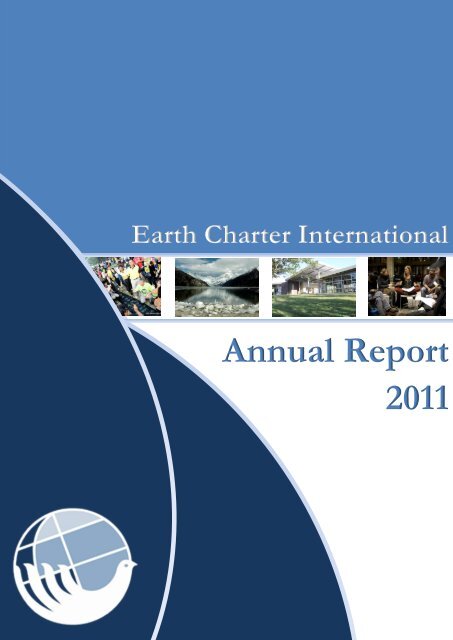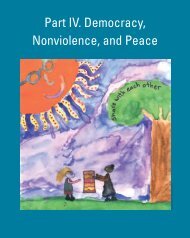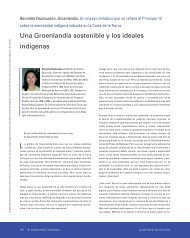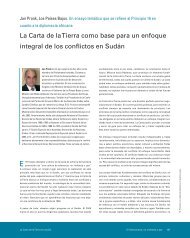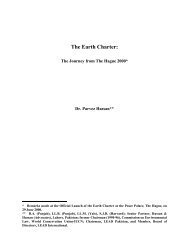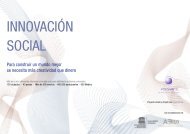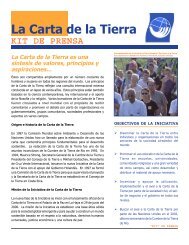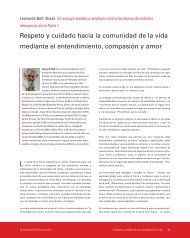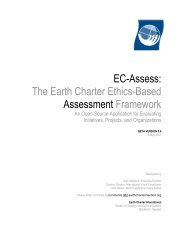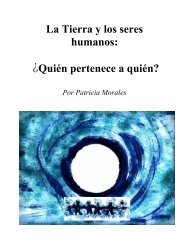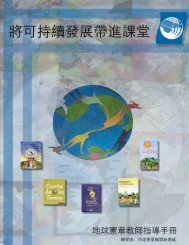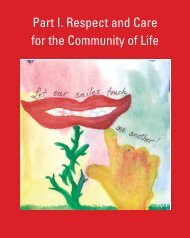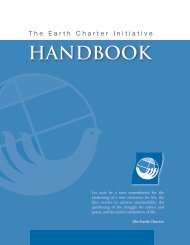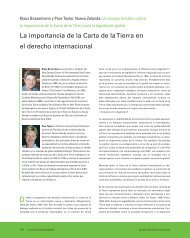Download - Earth Charter Initiative
Download - Earth Charter Initiative
Download - Earth Charter Initiative
You also want an ePaper? Increase the reach of your titles
YUMPU automatically turns print PDFs into web optimized ePapers that Google loves.
<strong>Earth</strong> <strong>Charter</strong> InternationalAnnual Report2011
Table of ContentsForeword 1I. Introduction 3II. Governance structure of <strong>Earth</strong> <strong>Charter</strong> International – ECI 4III. Goals and Achievements of ECI 51. Network management, outreach efforts and communication services 52. Education 103. RIO+20 13IV. Strategy and Challenges 16V. Plans for 2012 18VI. Walking the Talk 19VII. Finances 20VIII. The <strong>Earth</strong> <strong>Charter</strong> <strong>Initiative</strong>:Examples of Activities of Affiliates and Partners 23IX. GRI Indicators 30X. Attachments 34A. List of ECI Affiliates 34B. List of EC Youth and Student Groups 44C. EC National Web sites 50<strong>Earth</strong> <strong>Charter</strong> Annual Report 2011
Foreword2011 was a year focused on the construction of the new <strong>Earth</strong> <strong>Charter</strong> Center of Education ForSustainable Development at the University for Peace, the creation of the new UNESCO Chair onEducation for Sustainable Development, the <strong>Earth</strong> <strong>Charter</strong> contribution to the Rio+20 process,and an initial social media effort.After navigating the design and permits phase, ECI, in collaboration with UPeace, selected the builderand initiated construction of the new Center. By the end of the year, the foundations were completedand the walls and roof in place. These tasks all required visioning, the collaboration of many people,and trust, especially from those who offered financial contributions to this effort. A significant part ofthe year was also dedicated to familiarizing and engaging the <strong>Earth</strong> <strong>Charter</strong> network to the Rio+20process. ECI committed to contributing to Rio+20 objectives by engaging the network and also inelaborating documents making the linkages between the <strong>Earth</strong> <strong>Charter</strong> and Rio+20 themes. This alsoinvolved the initial work on a communications campaign towards Rio+20 and a social media effort.This was the first time the Secretariat had a dedicated staff member for social media andcommunication.In parallel, ECI also worked on what will be one of the foundation projects for this new facility withthe development of the proposal for a new UNESCO Chair on Education for SustainableDevelopment with the <strong>Earth</strong> <strong>Charter</strong>. A major focus for ECI going forward is implementing thesustainability vision that is articulated in the <strong>Earth</strong> <strong>Charter</strong> principles through learning and education.Throughout the year we worked on some publications relevant to Rio+20 themes and to the UNESCODecade on Education for Sustainable Development. ECI offered several online training programs fordifferent groups, especially for youth, empowering young leaders to implement the sustainabilityprinciples of the <strong>Earth</strong> <strong>Charter</strong> in their lives and spheres of work.During this year, ECI significantly advanced the goals set for the <strong>Earth</strong> <strong>Charter</strong> <strong>Initiative</strong>. We recognizeand gratefully acknowledge that much of this work is only possible thanks to the dedication of theSecretariat staff and the many volunteers, youth groups, partners and active ECI Affiliates who helpedadvance the <strong>Earth</strong> <strong>Charter</strong> <strong>Initiative</strong>, either through the <strong>Earth</strong> <strong>Charter</strong> Youth Network, though thedevelopment of publications for Rio+20, or in the communications campaign in Brazil. We pay tributeto the immense contributions of these many dedicated individuals whose contributions are critical toadvancing the <strong>Earth</strong> <strong>Charter</strong> <strong>Initiative</strong>’s goals.2011 was also a year of great loss with the passing away of our dear colleague, Marina Bakhnova.Marina worked directly for the <strong>Earth</strong> <strong>Charter</strong> International Secretariat since 2002, and was a hub forthe <strong>Earth</strong> <strong>Charter</strong> with the Eastern European region. Her softness and gentleness is missed in theoffice and among those in the <strong>Earth</strong> <strong>Charter</strong> network with whom she had a special relationship. Shemarked peoples’ lives by the special way she cared for people and animals; an attitude presentthroughout her daily actions.1<strong>Earth</strong> <strong>Charter</strong> Annual Report 2011
We also lost Nobel Laureate and Greenbelt Movement founder Wangari Maathai, who was an <strong>Earth</strong><strong>Charter</strong> Commissioner and member of <strong>Earth</strong> <strong>Charter</strong> Steering committee for many years. Wangari wasa special human being with her constant smile, positive attitude, and strength that touched the lives ofso many people. She inspired many of us to remain committed and do anything possible to make thisworld a better place.Reflecting on these losses raises important questions: how do our lives influence people for good?What footprint does our passage on <strong>Earth</strong> leave through our relationship with families, friends, andareas of influence? Are we doing enough given our capacities and the opportunities we are privileged toreceive? How can we better contribute to the causes we believe in and to the betterment of our Planet?The turning of the year and the preparation of such a report is always a useful reflection that can helpto identify the lessons learned and clarify our vision for the future. There is much that each one of uscan still do and hopefully in 2012 we will have the chance to demonstrate “our responsibility to oneanother, to the greater community of life, and to future generations”.Mirian Vilela, Executive DirectorBrendan Mackey, Razeena Omar and Alide Roerink, Co-chairs2<strong>Earth</strong> <strong>Charter</strong> Annual Report 2011
I. IntroductionThe <strong>Earth</strong> <strong>Charter</strong> <strong>Initiative</strong> is a global network of people, organizations, and institutions thatparticipate in promoting and implementing the values and principles of sustainability expressedin the <strong>Earth</strong> <strong>Charter</strong>. Participants include leading international institutions, nationalgovernments, universities, non-government organizations and community-based groups, citygovernments, faith groups, schools, and businesses – as well as thousands of individuals.<strong>Earth</strong> <strong>Charter</strong> International (ECI) consists of a Council and Secretariat. ECI’s purpose is to advancethe <strong>Earth</strong> <strong>Charter</strong> <strong>Initiative</strong> Mission and Vision. It endeavors to promote the dissemination, adoption,use, and implementation of the <strong>Earth</strong> <strong>Charter</strong> and to support the growth and development of the <strong>Earth</strong><strong>Charter</strong> <strong>Initiative</strong>. The ECI Council was created in 2006 as part of a major reorganization andexpansion of <strong>Earth</strong> <strong>Charter</strong> activities.Currently, there are EC <strong>Initiative</strong> projects and activities underway in over 80 countries. Countries thatare particularly active include Mexico, the Netherlands, Spain, Brazil, Costa Rica, India, Russia,Germany, The United States, Taiwan-China, Nigeria, Tajikistan, and the United Kingdom.The mission of the <strong>Earth</strong> <strong>Charter</strong> <strong>Initiative</strong> is: to promote the transition to sustainable ways of living and a globalsociety founded on a shared ethical framework that includes respect and care for the community of life, ecological integrity,universal human rights, respect for diversity, economic justice, democracy, and a culture of peace.The EC <strong>Initiative</strong> vision statement is: We envision individuals, organizations, businesses, governments, andmultilateral institutions throughout the world, including the United Nations General Assembly and UN agencies,acknowledging the <strong>Earth</strong> <strong>Charter</strong>, embracing its values and principles, and working collaboratively to build just,sustainable, and peaceful societies.3<strong>Earth</strong> <strong>Charter</strong> Annual Report 2011
II. Governance structure of <strong>Earth</strong> <strong>Charter</strong>International – ECIThe <strong>Earth</strong> <strong>Charter</strong> International Council provides leadership and guidance to the broader EC<strong>Initiative</strong>. However, it does not directly govern or control the <strong>Earth</strong> <strong>Charter</strong> <strong>Initiative</strong> as awhole. The <strong>Initiative</strong> is not governed in any formal sense. The Council is responsible only forthe governance of <strong>Earth</strong> <strong>Charter</strong> International and in particular, overseeing the work of the ECISecretariat. The Council has 17 members, from 13 countries, is gender balanced, and represents allregions of the world. It elects its own members in consultation with the global network of <strong>Earth</strong><strong>Charter</strong> supporters. The Council meets once a year and its Executive Committee, composed of eightmembers, meets two to four times a year. The Executive Director of the ECI Secretariat participates inall these meetings, as an ex-officio member.The ECI Secretariat staff is composed of the Executive Director, two regional coordinators, aninteractive and social media coordinator, and one youth facilitator. In addition, during 2011, fiveinterns worked on a full time basis at the Secretariat. Most of them were graduate students fromJyväskylä University, Finland. There were also two part-time interns. In addition, three part timeinterns from the University for Peace collaborated on specific projects. There are also a number ofvolunteers in different parts of the world constantly helping the efforts of the Secretariat.The ECI Secretariat operates in Costa Rica as a semi-autonomous center under the legal umbrella ofthe University for Peace. The ECI Secretariat and the University for Peace cooperate in several ways.UPEACE provides office space and administrative management services, while the ECI Secretariatoffers courses in UPEACE Masters programs related to sustainability, and occasionally supportsstudents in their research.As ECI is not a legally incorporated organization, <strong>Earth</strong> <strong>Charter</strong> Associates, Ltd. (ECA) was created inthe United States in 2006 to provide legal, financial, and fund raising services in support of ECI, suchas the trade mark registration of the EC logo. ECA is registered in The United States as a charitable(501c3) organization.4<strong>Earth</strong> <strong>Charter</strong> Annual Report 2011
III. Goals and Achievements of the ECISecretariatThe ECI Secretariat aims to raise awareness about the <strong>Earth</strong> <strong>Charter</strong> worldwide and promote itsuse with the purpose of facilitating the transition towards a more sustainable society.ECI GOALS:1. To raise awareness worldwide of the <strong>Earth</strong> <strong>Charter</strong> and to promote understanding of its inclusiveethical vision.2. To seek recognition and endorsement of the <strong>Earth</strong> <strong>Charter</strong> by individuals, organizations, and theUnited Nations.3. To promote the use of the <strong>Earth</strong> <strong>Charter</strong> as an ethical guide and the implementation of its principlesby civil society, business, and government.4. To encourage and support the educational use of the <strong>Earth</strong> <strong>Charter</strong> in schools, universities, religiouscommunities, local communities, and many other settings.5. To promote recognition and use of the <strong>Earth</strong> <strong>Charter</strong> as a soft law document.1. Network management, Outreach Efforts and CommunicationServicesGiven the decentralization strategy of ECI, and the small size of the Secretariat, ECI relies significantlyon its network to move towards the implementation of the <strong>Earth</strong> <strong>Charter</strong> <strong>Initiative</strong> objectives.Therefore, the ECI Secretariat works primarily in nurturing, guiding and inspiring the existing networkand in the outreach of new groups that would embrace the <strong>Earth</strong> <strong>Charter</strong> vision and incorporate it aspart of their work. In this context, during 2011, the ECI Secretariat worked with the following:AFFILIATESECI Affiliates are organizations that share the <strong>Earth</strong> <strong>Charter</strong> vision and are committed to promotingthe <strong>Earth</strong> <strong>Charter</strong> and helping implement ECI strategies in their countries. By the end of 2011, therewere 119 ECI Affiliates from 68 countries. During 2011, new affiliates and partnership agreementswere signed with: the Centre for Environment and Development Studies (CEDS) of Hong Kong,5<strong>Earth</strong> <strong>Charter</strong> Annual Report 2011
China; the UNESCO Chair ICT in Education for Sustainable Development, University of Crete; CSRIran; Emirates Diving Association, United Arab Emirates; Asociación Innovar en Valores, Spain; ElGrupo de Investigación Vida Urbana y Ambiente de la Universidad Simón Bolívar, Venezuela; andSocial Development International from Cameroon. Appendix A offers a full list of current ECIAffiliates.Earlier in the year, the ECI Secretariat decided that cultivating existing relationships was the priority for2012 rather than increasing the number of affiliates or partners. Therefore, the number of new affiliatesand partners has not changed significantly from 2010. There are countries, such as the United States orMexico, where there are many <strong>Earth</strong> <strong>Charter</strong> actions, but there are only one or two Affiliates, and many<strong>Earth</strong> <strong>Charter</strong> actions that are not led by ECI Affiliates. Some examples of ECI Affiliates work areprovided in section VIII, and more details can be found in the respective country page on the <strong>Earth</strong><strong>Charter</strong> Web site.YOUTHThe ECI Secretariat encourages and empowersyoung people to take on the responsibility ofinitiating <strong>Earth</strong> <strong>Charter</strong> activities in their homecommunities so that they can spread theimportance, knowledge, and principles ofsustainability. <strong>Earth</strong> <strong>Charter</strong> Youth/StudentGroups (ECYG) are groups of youth studying the<strong>Earth</strong> <strong>Charter</strong>, drawing upon it as a source ofinspiration, and then organizing small actionprojects in their local communities onsustainability.There are currently 123 <strong>Earth</strong> <strong>Charter</strong> Youth / Student Groups (ECYGs) spread across 53 differentcountries, 31 of which were newly formed in 2011. The new ECYG are from the following countries:Austria, Colombia, Dominican Republic, Egypt, Greece, Honduras, Malawi, Malta, Malaysia, Nepal, theNetherlands, Rwanda, Taiwan, and the United Arab Emirates. The newly founded ECYGs in Greece,Malawi, and Malta were the first <strong>Earth</strong> <strong>Charter</strong> contacts in each country. (See Appendix B for a full listof ECYGs).During 2011, a number of interesting activities were undertaken by ECYG. The details about ECYGswork can be found at the <strong>Earth</strong> <strong>Charter</strong> Web site’s Youth News and the Youth Groups’ Wiki-profiles.6<strong>Earth</strong> <strong>Charter</strong> Annual Report 2011
Youth Task ForceThe development of the <strong>Earth</strong> <strong>Charter</strong> Youth Task Force (EC YTF) has its roots in the EC onlinecourse, entitled “Youth Leadership, Sustainability and Ethics” held in August 2010. At the close of thismonth-long course, the participants continued (for a couple of months) meeting once a week online toshare their experiences with the <strong>Earth</strong> <strong>Charter</strong>.In April 2011, this group of EC Youth activists from all over the world pulled together a first-ever ECYouth e-Conference. The e-Conference brought together nearly 80 participants from more than 30countries. Many connections were made and new ideas were exchanged during the discussions. The e-Conference was reported in the UN Youth Flash, which is a service of the United Nations Programmeon Youth. As a result of this successful online gathering these youth decided to formalize their groupand to start an official EC Youth Task Force (EC YTF).During 2011, the EC YTF established ten Working Groups: Technical, Communications, Outreach,Campaigns, Partnerships, Volunteer Management, Community Management, Projects, Gatherings, andFunding. A coordinator has been elected for each of these ten Working Groups and a meeting was heldonce a month to give members the opportunity to update and share with each other what they havebeen doing in each of their Working Groups. Towards the end of 2011, the EC YTF set 10 tangiblegoals, and appointed 53 Country Activators to serve as a motivator and point of contact. Each CountryActivator posts a report once a week on the YTF’s Wikispace page.Youth Partner OrganizationsPartner organizations integrate the <strong>Earth</strong> <strong>Charter</strong> into their work in different ways. Some examples are<strong>Earth</strong> <strong>Charter</strong> inspired trainings, supporting the operations of the <strong>Earth</strong> <strong>Charter</strong> youth network,creating EC related materials, promoting the EC <strong>Initiative</strong> on their Web sites, among others. Partnerorganizations include Youth Action for Change (YAC), Tread Lightly (a programme ofTakingITGlobal), Beat Board BTV, Thumbs Up, Road to Rio+20, Reto Juvenil International CostaRica,1%CLUB, EOTO World, OAYouth, and SHIFT Network.Youth Online ActivismIn October, in partnership with Road to Rio+20/PeaceChild International, <strong>Earth</strong> <strong>Charter</strong> International hosted an e-Conference for the Major Group for Children and Youth(MGCY) on Rio+20, which involved 53 participants. Itspecifically targeted the Zero Draft process and providedthe MGCY the opportunity to present the work of theirthree youth task forces, as well as emphasize the importanceof utilizing the <strong>Earth</strong> <strong>Charter</strong> as an ethical framework forthe Rio+20 process and beyond.The Youth Center of Ciudad Colon (a small town near the7<strong>Earth</strong> <strong>Charter</strong> Annual Report 2011
ECI Secretariat and the University for Peace) and the ECI Secretariat collaborated in a CommunityBuilding workshop in December 2011 focusing on the youth of Ciudad Colon. An overview of the<strong>Earth</strong> <strong>Charter</strong> was provided and a series of activities were done with the participants, such as visioningwhat can be done to make the community more sustainable to live in. Due to the success of this pilotworkshop, the Youth Center and <strong>Earth</strong> <strong>Charter</strong> youth network have agreed to join forces and conduct<strong>Earth</strong> <strong>Charter</strong> related activities throughout the month of April, 2012VOLUNTEERSIn 2008, an online mechanism for EC volunteer registration was established on the EC Web site, whereindividuals can register for several projects or focus areas. There are 1,268 registered volunteers from102 different countries as of December 31st, 2011. In total, there were 295 newly registered volunteersin 2011 (See Appendix C) to work on 9 projects (related to translations, creating communication tools,and presentations, and several others). On average, there are 25 new volunteers enrolled each month.The majority of them are from Latin America, especially Mexico. For the first time, volunteersenrolled from the following countries: Algeria, Ivory Coast, Moldova, Saudi Arabia and Oman. It isimportant to note that there are a number of informal volunteers that work with the <strong>Earth</strong> <strong>Charter</strong> andare not registered in this data base.The majority of volunteers offer to contribute with translation and dissemination of the <strong>Earth</strong> <strong>Charter</strong>locally. One example to highlight is the translation of the <strong>Earth</strong> <strong>Charter</strong> in 10 of the 11 languages ofSouth Africa. Staff members from Zodwa Khoza Foundation are partnering with the South AfricanTranslators Association to develop these translations.ENDORSERSThe ECI Secretariat also has the task of maintaining an online endorsers’ database. The most commonmethod to endorse the <strong>Earth</strong> <strong>Charter</strong> is through EC Web site. However, there are instances whereendorsements are done at public events on paper, which makes it difficult to keep such information inthe current database. For example, in Malaysia on October 9th, more than 5,000 people endorsed the<strong>Earth</strong> <strong>Charter</strong> during a mass gathering, andthese endorsement groups and many othersare not incorporated in the current database.Only organizational endorsements are madepublic. Among the most recent organizationalendorsers are: the Toronto EnvironmentalAlliance; Sabah Environmental ProtectionAssociation (SEPA); EASLCE (EuropeanAssociation for the Study of Literature,Culture and Environment.8<strong>Earth</strong> <strong>Charter</strong> Annual Report 2011
As of December 2011 there were 24,892 registered endorsements of the <strong>Earth</strong> <strong>Charter</strong>, out of whichover 5,942 are organizations and nearly 18,950 are individuals. The number of endorsers continues torise steadily, by an average of 2,000 endorsers a year.COMMUNICATION SERVICESThe ECI Secretariat maintains an international Web site, available in English, French, and Spanish. Thesite serves as an information hub for the EC network, offering an overview of activities andorganizations involved with the <strong>Earth</strong> <strong>Charter</strong> <strong>Initiative</strong>, organized by country (there are 100 countrypages) and by topic or focus area.One of the main objectives of the Web site is to allow for the sharing of experiences and goodpractices. For this purpose, specific pages within each focus area were created for the display ofsystematized stories on how different organizations work with the <strong>Earth</strong> <strong>Charter</strong>. The internationalWeb site also contains a Virtual Library with over 800 resources available for free and work to improvethem is constantly underway.In June 2011, ECI received a grant from Kalliopeia Foundation to develop and implement an onlinecommunication strategy. This involved the assessment work of the online <strong>Earth</strong> <strong>Charter</strong> presence,specially the Web site, which was undertaken with the help of Fenton, a California based organization,as well as the design of a social media strategy and of a new Web site for the <strong>Earth</strong> <strong>Charter</strong> <strong>Initiative</strong>.As of the end of 2011, following the findings of the assessment process, and recommendations drawnfrom that, a new Web site was in the process of being designed, along with a redesigned virtual library,and a new site featuring the results of a study linking the <strong>Earth</strong> <strong>Charter</strong> with international laws andconventions. All of this work will be fully completed in the first half of 2012.In 2011 there were over 599,351 visits to the main <strong>Earth</strong> <strong>Charter</strong> Web site (as compared with 849,645in 2010, this difference is probably due to the fact that there were major events in celebrations of <strong>Earth</strong>9<strong>Earth</strong> <strong>Charter</strong> Annual Report 2011
<strong>Charter</strong>+10 in 2010 and there was no communication campaign in 2011 based on a TV spot. Mostvisitors come from the United States, Mexico and Spain. Over the past year, special efforts have beenmade to address the language barrier with the development of Web sites in as many national languagesas possible (such as Arabic, Greek and Japanese). In 2011, 1 new national Web site was launched inPolish. The number of visitors to these national Web sites in various languages is not included in theabove number of visits. Attachment C shows the list of all available EC Web sites.The Wikipedia articles on the <strong>Earth</strong> <strong>Charter</strong> are also an important resource. The article in Englishreceived 23,691 visits during 2011, while the Spanish article received 204,753 visits. For both articles,there was an evident increase of visits on <strong>Earth</strong> Day (22 April).The ECI Secretariat is also active on social media sites and made a special effort to increase its work inthis relatively new field (including understanding how to make better use of it and its limitations). ECIoperates a Facebook page and has a Google+ account, and is active on YouTube with more than 200uploads and favorites, more than 350 channel subscribers and more than 200,000 views. There are alsoFacebook pages in Spanish and Portuguese (but with fewer followers and less activity due to theSecretariat capacity). A Spanish <strong>Earth</strong> <strong>Charter</strong> Youth Facebook group was created, in the second half ofthe year, in addition to the already established English EC Youth Facebook group, to ensure a steadyflow of information and space for Spanish and Portuguese-speaking youth to communicate and shareideas.The Wikispace for <strong>Earth</strong> <strong>Charter</strong> youth activists, created in 2009, was further developed in 2011. Itspurpose is to facilitate contact between new and current <strong>Earth</strong> <strong>Charter</strong> Youth/ Student Groups. TheWikispace was visited 112,501 times in 2011 by people from 182 countries. The ECYG Wiki can beaccessed at http://ecyg.wikispaces.com/.In addition, a new <strong>Earth</strong> <strong>Charter</strong> communications campaign was initiated in Brazil to make connectionsbetween the <strong>Earth</strong> <strong>Charter</strong> and the Rio+20 objectives. Towards the end of 2011, the campaign startedon production of two television public service announcements, with the support of AES Brazil andMethodist University of Sao Paulo.2. Education-The <strong>Earth</strong> <strong>Charter</strong> Center for Education for SustainableDevelopment and UNESCO Chair-UNESCO CHAIRDuring the first half of 2011, the ECI Secretariat workedon a proposal to become a UNESCO Chair on Educationfor Sustainable Development with the <strong>Earth</strong> <strong>Charter</strong>,10<strong>Earth</strong> <strong>Charter</strong> Annual Report 2011
which was approved by UNESCO. The newly established UNESCO Chair will be co-hosted by theUniversity for Peace and the <strong>Earth</strong> <strong>Charter</strong> Center for Education for Sustainable Development for thenext four years, starting in early 2012. The purpose of the Chair is to work on research and training oneducation for sustainable development through transformative education experiences that cultivate thefundamental values and ethical vision necessary to move towards a more sustainable world. Theuniqueness of this project is that it will work at the intersection of education, sustainability, and ethicsusing the <strong>Earth</strong> <strong>Charter</strong> as a framework. It will develop workshops and courses for educators, youngleaders, and business groups. The courses will also offer an opportunity to further explore the practicalimplementation of the sustainability paradigm and the <strong>Earth</strong> <strong>Charter</strong> principles in management,leadership, and education settings.NEW BUILDING AND EDUCATION CENTER FACILITYThanks to a generous donation from the Breesaap Company of Mr. Ruud Lubbers, <strong>Earth</strong> <strong>Charter</strong>Commissioner, a new building was constructed to house the ECI Secretariat and the <strong>Earth</strong> <strong>Charter</strong>Center for Education for Sustainable Development at the University for Peace campus in Costa Rica.Construction began in the second half of 2011 1 . A significant part of the ECI Secretariat ExecutiveDirector work during 2011 was dedicated to overseeing this construction project. In 2011, this projectinvolved the process of selecting the construction company through private bidding, building differentbudget scenarios, obtaining construction permits, the actual construction with the selection andpurchase of materials, and weekly coordination meetings.The blueprint for the building was developed and approved in 2010, and to be consistent with the<strong>Earth</strong> <strong>Charter</strong> vision, it follows principles of green building as set by the LEED (Leadership in Energyand Environmental Design) Certification program.The UNESCO Chair and the new building are complementary and offer ECI a strong foundation towork on in 2012 and beyond.WORKSHOPS AND ONLINESEMINARSThroughout 2011, the ECI Secretariatused online education opportunities as ameans to spread the sustainability visionthat the <strong>Earth</strong> <strong>Charter</strong> articulates andhelp connect people around the <strong>Earth</strong><strong>Charter</strong> <strong>Initiative</strong>. These educationalopportunities were open to the public.The first four webinars took placethroughout September 2011; these were1The building was completed in the first quarter of 201211<strong>Earth</strong> <strong>Charter</strong> Annual Report 2011
an introduction to the <strong>Earth</strong> <strong>Charter</strong> and were offered in English and Spanish. More than 100participants from all over the world participated in these webinars to learn and discuss the <strong>Earth</strong><strong>Charter</strong> ethical framework and how to implement it in all facets of life, work, and community.In October, the ECI Secretariat hosted a workshop led by Stephanie Tansey on dialogue andcommunication skills to promote sustainability. More than 50 attendees participated in this onlineworkshop where she explained some of the techniques she has been using to share the <strong>Earth</strong> <strong>Charter</strong>message in Turkmenistan, Israel, Nigeria, and now in China.During the last quarter of 2011, ECI offered several workshops on the UPEACE campus on the use ofthe EC Assess tool. ECI partnered with the UPEACE Sustainability and Environmental Club andseveral students carried out an assessment of the university.The ECI Secretariat organized an online course, “Euro-Arab youth collaboration for more sustainableworld - Online youth sustainability leadership course” in June-July 2011. 29 youth from the Euro-Arabregion gathered online every week to discuss sustainable ways of living, sustainable development, andglobal, shared ethics and their relation to intercultural dialogue.In March 2011, an online course called “Transition to a Sustainable Lifestyles with the <strong>Earth</strong> <strong>Charter</strong>!”,was organized together with Tread Lightly (a programme of TakingITGlobal), targeting young leaders.32 participants from 28 different countries gathered to learn, share, and experience sustainable ways ofliving. During this course, the <strong>Earth</strong> <strong>Charter</strong> was used as a roadmap for defining sustainability.For the second year in a row, <strong>Earth</strong> <strong>Charter</strong> International and Youth Action for Change (YAC)collaborated in offering a five-week short course entitled, “Youth Leadership, Sustainability andEthics.” The course ran from October to November 2011. Due to the success of the first ECI andYAC short course in 2010, over 350 applications were received and 45 participants were selected.VIDEO CONTESTThe ECI Secretariat organized an international video essay contest for schools based on the principlesof the <strong>Earth</strong> <strong>Charter</strong> with the purpose to sensitize schools about the <strong>Earth</strong> <strong>Charter</strong>. This contest ranfrom July to November 2011. The added value of a project like this is the possibility to connect atangible action with school teachers and students and help them reflect on the <strong>Earth</strong> <strong>Charter</strong>. Thecompetition received positive feedback and 26 videos weresubmitted.The first prize went to the video called “It starts with one!”submitted by students of Nottingham Elementary School inArlington, Virginia (USA). Other videos received specialmentions for their creativity, effects, music, etc. Find all theinformation in this link. This video contest also gave the ECISecretariat the possibility to partner with the British Embassyin Costa Rica and their Odyssey 2050 film project.12<strong>Earth</strong> <strong>Charter</strong> Annual Report 2011
PUBLICATIONS AND MATERIALSThe following <strong>Earth</strong> <strong>Charter</strong> related publications were developedand published during 2011:•Exploring synergies between faith values and education forsustainable development ECI, UNESCO San Jose Office, andUniversity for Peace.•The <strong>Earth</strong> <strong>Charter</strong> and Green Economy. ECI Secretariat.•Principles for the Green Economy. A collection of principles forthe green economy in the context of sustainable development andpoverty eradication. Stakeholder Forum, Bio-regional and ECISecretariat.•Enabling a Flouring <strong>Earth</strong>: Challenges for the Green Economy, Opportunities for GlobalGovernance. Klaus Bosselman, Brendan Mackey, and Peter Brown. Stakeholder Forum. Read thearticle here.•ISO Standard 26000 Guidance for social Responsibility and the <strong>Earth</strong> <strong>Charter</strong>. Read the article here.•Theses using the <strong>Earth</strong> <strong>Charter</strong> (published 2011 in the EC Virtual Library): Two graduate studentshave completed theses which used the <strong>Earth</strong> <strong>Charter</strong> as a framework for their research, and submittedthem to their respective universities in the United States and Brazil. 1. “Assessment of education forsustainable development in Universities in Costa Rica: implications for Latin America and theCaribbean”, Jairo Garcia PhD, Pepperdine University, Graduate School of Education and Psychology(United States) - 2. “Using The <strong>Earth</strong> <strong>Charter</strong> in Social Responsibility Actions of Agribusiness in RuralAreas”, Fernanda de Paulo Nonato, Master degree, Universidade Federal do Ceará, Centro de CienciasAgrarias, Departamento de Economia Agricola.3. RIO+20: ECI Secretariat and EC <strong>Initiative</strong>-Rio+20 Process-In early 2011, the ECI Council and Secretariat generated a strategy and various documents as acontribution to the Rio+20 Process. All this information has been compiled on EC’s main Web site, inEnglish and Spanish. Only the general information has been translated into French. The following arethe most relevant actions around the <strong>Earth</strong> <strong>Charter</strong> and Rio+20 during 2011.13<strong>Earth</strong> <strong>Charter</strong> Annual Report 2011
The <strong>Earth</strong> <strong>Charter</strong> <strong>Initiative</strong> main goal for Rio 2012 was set as “to emphasize the need for acomprehensive ethical framework, articulating shared values and principles to inspire and guidedifferent actors in the transition to a sustainable future. The aim is also to demonstrate the relevance ofthe <strong>Earth</strong> <strong>Charter</strong> to the objectives of the Rio 2012 Conference and its process.” Along these lines, theECI Secretariat organized two sets of online meetings with the objective of bringing together ECIaffiliates, close partners, and friends to share views on the ECI’s plans and strategies towards Rio+20,as well as offer participants an overview of the Rio+20 preparatory process.The first set of online meetings was held from June 28th to 30th, 2011. Three regional meetings wereorganized, each with the same content. The first was held in Spanish for people from Latin America,Spain, and Portugal, the second one was focused on North America, Europe, Africa and the MiddleEast, and the third meeting was for the Asia-Pacific region.Around 70 ECI affiliates, partners, and youth activists participated in this first set of meetings. Overall,these meetings achieved their objective of informing participants and fostering the kind of meaningfuldialogue that could help embed the <strong>Earth</strong> <strong>Charter</strong> message in Rio+20 discussions in these regions.Follow-up meetings were held from August 17th to 19th, 2011 with approximately 60 participants.ECI hosted numerous online meetings, webinars, and networking sessions related to Rio+20 andthereby increased its exposure considerably among international youth activists and organizations.The <strong>Earth</strong> <strong>Charter</strong> was integrated in the declaration of the UN Department of Public InformationNGO Forum, held in Bonn, Germany in September, 2011. This civil society Declaration was widelyreferenced for the compilation text of the Rio+20 conference.In the second half of the year, ECI Council members and close partners wrote a document that wassubmitted to the United Nations as recommendations for the so-called zero draft compilationdocument for the Rio+20 Summit. This zero draft formed the starting point for the ensuingintergovernmental negotiations of Rio+20. The ECI submission was revised through a consultationprocess with <strong>Earth</strong> <strong>Charter</strong> supporters using an online collaborative editing program, where within aperiod of one month contributors were able to edit the document online, suggest changes, andcomment on the changes and suggestions. Around 30 people actively participated in this draftingprocess. The final document was submitted on November 1st, 2011, and can be seen at the UNCSDsubmissions Web site.In addition to the ECI submission, four U.N. Member States and 27 civil society organizations madereferences to the <strong>Earth</strong> <strong>Charter</strong> in their recommendations to the compilation document. Five of theseorganizations are <strong>Earth</strong> <strong>Charter</strong> affiliates and one of them is a partner organization.At the December 2011 UNCSD intersessional, the Russian delegation made the following statementabout the <strong>Earth</strong> <strong>Charter</strong>:14<strong>Earth</strong> <strong>Charter</strong> Annual Report 2011
“Based on this document, we should in the future make concrete plans to achieve the Rio objectives.The Russian Federation has suggested endorsement of the <strong>Earth</strong> <strong>Charter</strong> or the <strong>Charter</strong> of SustainableDevelopment”.A number of ECI affiliates and ECI Council members were actively involved in the Rio+20preparatory process stressing the need for a common ethical foundation to guide decisions and sharingthe <strong>Earth</strong> <strong>Charter</strong> input document to Rio+20 as appropriate.15<strong>Earth</strong> <strong>Charter</strong> Annual Report 2011
IV. Strategy and ChallengesSTRATEGYThe Decentralized Empowerment for Scaling Up strategy, adopted in 2007, continued toprovide the main guidance for ECI work. Therefore in 2011, the ECI Secretariat continued todepend on the <strong>Earth</strong> <strong>Charter</strong> network’s capacity as the primary vehicle for achieving the goalsof the <strong>Earth</strong> <strong>Charter</strong> <strong>Initiative</strong>. Along these lines, a key function of the ECI Secretariat has beento serve the <strong>Earth</strong> <strong>Charter</strong> <strong>Initiative</strong>/network, in processing and sharing information about activitiesand projects and make it available through its Web site newsflashes and social media instruments. TheSecretariat is also committed to improving this service, such as through launching a redesigned andimproved Web site, organizing a number of online fora, and more focused activity in social media. TheECI Secretariat also continued to nurture relationships with the existing network, continuing to shareinformation and through some specific collaborative projects, including elaborating key resourcematerials.As per an ECI Council decision, the ECI Secretariat also worked in 2011 towards Rio+20 with the aimof having the <strong>Earth</strong> <strong>Charter</strong> document, and the initiative network, contribute to the Rio+20 objectives.As noted above, this involved the development of supporting materials, conducting online fora, andworking on a communications campaign towards Rio+20.CHALLENGESWhile there are a number of groups from around the world using the <strong>Earth</strong> <strong>Charter</strong> in differentsettings, most of these experiences and lessons learned are not captured into stories. However, if theywere they would provide very useful material for motivating and inspiring others. This would also helpthe Secretariat better assess the result of efforts inspired by the <strong>Earth</strong> <strong>Charter</strong>. ECI needs to continueto improve its capacity to demonstrate both the quantifiable and qualitative impacts arising from theuse of the <strong>Earth</strong> <strong>Charter</strong>. The task, then, is to continue to collect and process stories, share bestpractices using the <strong>Earth</strong> <strong>Charter</strong>, and improve our capacity to document case studies through shortvideos or written published articles. A complementary need is to augment ECI’s ability to capture,track, and display statistical information about <strong>Earth</strong> <strong>Charter</strong> use and impacts. If more connections canbe made with the real world experiences of people using the <strong>Earth</strong> <strong>Charter</strong>, more synergy andcollaboration will emerge, and consequently the movement will be stronger.It has also been challenging to engage the network in sharing some of their activities through socialmedia (either Facebook or online fora). This is, most likely, partly due to a generation divide, as manypeople involved in the <strong>Earth</strong> <strong>Charter</strong> network are not using, nor are very familiar with the use ofFacebook and other online communication platforms. Also, there are many new initiatives emergingand positioning the <strong>Earth</strong> <strong>Charter</strong> in the midst of a space filled with many other ideas is difficult.16<strong>Earth</strong> <strong>Charter</strong> Annual Report 2011
In the communication efforts, a major challenge has been to craft the <strong>Earth</strong> <strong>Charter</strong> message in simplelanguage so that communicators can easily translate core message into short videos.While the decentralization strategy has proven successful in many respects, some difficulties havebecome apparent in its implementation. Not all individuals and groups around the world have thecapacity to implement the <strong>Initiative</strong> goals or to incorporate them as part of their own objectives.Furthermore, not all people and organizations perceive with sufficient clarity and commitment a senseof belonging and altruism that motivates them to actively contribute to the aims and objectives of the<strong>Earth</strong> <strong>Charter</strong> <strong>Initiative</strong>.17<strong>Earth</strong> <strong>Charter</strong> Annual Report 2011
V. Plans for 2012In December 2011, the <strong>Earth</strong> <strong>Charter</strong> International Council met in New York, to assess progressand discuss priorities and directions for the future. Among the important outcomes of this Councilmeeting, was the identification of the priority areas for the ECI Secretariat for 2012, which are:1) Education for sustainability - Setting up the new <strong>Earth</strong> <strong>Charter</strong> Center for ESD (in a new officefacility) and the establishment and work of the new UNESCO Chair on Education for SustainableDevelopment with the <strong>Earth</strong> <strong>Charter</strong>.2) Networks – Continue its work in facilitating the efforts of its networks of Affiliates, youth groups,and volunteers through the soon-to-be launched new Web site and social media sites. Continue toengage individuals, groups and organizations in using the <strong>Earth</strong> <strong>Charter</strong> and in knowledge/experiencesharing. ECI is planning new webinars, online youth leadership training, youth e-Conferences andmeetings.3) Catalyze and Facilitate Ethical Dialogue – Continue efforts in catalyzing and facilitating dialogueon shared values and ethical principles, and their application to decision making, including policyinfluencing. The policy focus will be Rio+20 for 2012 and UNDESD (the UN Decade on Educationfor Sustainable Development) towards 2014. An <strong>Earth</strong> <strong>Charter</strong> event is being planned for Rio+20 inJune.With the end of 2011, a new phase for ECI is beginning with the establishment of the new UNESCOChair. In line with the Education Center and the new UNESCO Chair, ECI will be seeking to createpartnerships with Universities and other learning institutions to collaboratively develop materials,publications, and training programs. ECI expects that the Center will be a source of revenue and shouldbe a good step towards the diversification of income sources, which is essential for the financialsustainability of ECI.ECI’s challenges are fundamentally around the establishment and strengthening of the EducationCenter, making it economically sustainable, as well as broadening the funding base for operations. ECIwill have to augment its efforts in creating training programs, course curricula, and positioning itsEducational Center as a world-renowned center of excellence in ESD.There is plenty to do in 2012 in advance of Rio+20, the setting up of the new <strong>Earth</strong> <strong>Charter</strong> buildingand <strong>Earth</strong> <strong>Charter</strong> Center for Education for Sustainable Development, and in nurturing a strongernetwork of groups and individuals that share the <strong>Earth</strong> <strong>Charter</strong> vision and incorporate it as part of theiractivities.18<strong>Earth</strong> <strong>Charter</strong> Annual Report 2011
VI. Walking the TalkContinuing with a 2009 decision to critically assess its own operations and openly discuss itssustainability impacts, the ECI Secretariat decided for the third time to use the GRI G3Guidelines in reporting on its sustainability performance.The goal of the 2011 Annual Report is the achievement of the GRI Level C Application of theGuidelines. The Application Levels (A, B, or C) communicate to the Report’s readers to what extentthe G3 Guidelines have been utilized in the drafting of the document. To better monitor changes andtrends on ECI performance, the ECI Secretariat decided to maintain the structure of the 2009 annualreport using previously selected GRI Indicators.The Secretariat relies fully on hydroelectric power and its offices do not use any air conditioningsystem. However, international air transportation remains an area of major environmental impactrelated to ECI Secretariat’s work. As previously, CO2 emissions from air travels will be compensatedthrough the FONAFIFO (National Fund of Forest Financing) mechanism, a Costa Rican governmentprogramme. FONAFIFO collects the funds which are linked to carbon sequestration and otherenvironmental services (e.g. water production), and distributes these to landowners or organizationsthat are protecting the forests on their lands.The offset price for one CO2 ton in Costa Rica is US$5, therefore the ECI Secretariat will pay 2 US$135to FONAFIFO to compensate for the 27 CO2 tons emitted during business travels in 2011. Thedecrease of 100 tons in comparison with 2010 is attributed to the Secretariat representatives traveling tolocations hosting the EC+10 celebrations. Furthermore, a carbon footprint reduction and offsettingscheme will also be developed for the new building and Center. As noted above, sustainableconstruction practices for the new building are being followed. To this end, steps have been taken toobtain LEED Certification for sustainable construction.The following section provides more details on the ECI Secretariat performance based on GRIIndicators.2 The payment will be done during the first trimester of 2012.19<strong>Earth</strong> <strong>Charter</strong> Annual Report 2011
VII. FinancesThe University for Peace Human Resources and Finance Departments administrate all legal andfinancial issues pertaining to contracts with personnel and payments for staff and services. In this sense,ECI Secretariat ensures an adequate and transparent management of ECI funds.<strong>Earth</strong> <strong>Charter</strong> InternationalStatement of Fund BalancesAs of December 31, 2011ASSETS:USDRPA / <strong>Earth</strong> <strong>Charter</strong> Fund Balance 9,295UPEACE / <strong>Earth</strong> <strong>Charter</strong> Account70,526BalanceUPEACE/<strong>Earth</strong> <strong>Charter</strong> Account Balance172,708- Construction Project<strong>Earth</strong> <strong>Charter</strong> Brazil 13,984NET AVAILABLEASSETS: 266,513UNRESTRICTED & RESTRICTEDBALANCES:General Fund 57,137RESTRICTED BALANCES:Kalliopeia Foundation 22,684<strong>Earth</strong> <strong>Charter</strong> Brazil 13,984Construction Fund 172,708 20TOTAL UNRESTRICTED &RESTRICTED FUND BALANCES 266,51320<strong>Earth</strong> <strong>Charter</strong> Annual Report 2011
STATEMENT OF INCOME AND EXPENDITURES – 2011<strong>Earth</strong> <strong>Charter</strong> International - All Activity CentersJanuary 1 - December 31, 2011INCOME USD USDMajor Individual DonorsArmando Martinez Almuelle 10,000Hironaka Wakako 10,000Seaward Fund, RPA 5,000 3Various Sources / Ruud Lubbers 117,946Breesaap / Ruud Lubbers 81,432Amana-Key /Oscar Motomura 52,448 276,826Corporate/Business/AffilatesNCDO 27,005AES Eletropaulo -Restricted - EC Brazil 27,784 54,789Kalliopeia Foundation 70,000Individual Donors (Less than USD 10,000) 15,568International AgenciesUNESCO - Restricted 5,915European Commission/Brighton University - Restricted 11,928European Commission/Brighton University - Unrestricted 5,598 23,441Return on invested fund/ Interest Income 1,438Other/Miscellaneous 400Total Cash Income 442,462In-Kind SupportMajor Individual Donors 20,000Universities & Foundations 50,000Total In-Kind Support 70,000Total Income 512,4623 Represents Seaward Contribution for Fin'l Consultant $5,000 The Seaward Fund is a donor advised fund atRockefeller Philanthropy Advisors in NYC.21<strong>Earth</strong> <strong>Charter</strong> Annual Report 2011
EXPENSES USD USDSalaries, Professional Services and Related Expenses 187,164Employment Related Insurance 19,750Strategic, Program, and Communications Consulting Support 31,462Office Construction 293,174Telecommunications & Internet 5,721Translation Services 2,604Travel 18,046ECI Council Expenses (Travel and Meeting Costs) 5,175Office (Rent, Equipment, Security, and Expenses) 16,332Publication, Media, & Web Development 1,706Printing and Postage 2,519Financial Expenses 219Communications Consultant 30,000Miscellaneous 1,554Financial Consultant, ECA 5,000Legal Expenses, ECA 9,407 4Fund Management Expenses, ECA & RPA 6,688Total Cash Expenses 635,521In-Kind ServicesECI Council Meeting Expenses 20,000Office Space, HR & Financial Services 50,000 70,000Total Expenses 706,521SURPLUS/ (DEFICIT) -194,0594 Edwards Angell Palmer & Dodge, LLP22<strong>Earth</strong> <strong>Charter</strong> Annual Report 2011
VIII. The <strong>Earth</strong> <strong>Charter</strong> <strong>Initiative</strong>:-Examples of Activities of Affiliates and Partners-AFFILIATES AND PARTNERSThere are 119 affiliates from 68 countries and 25 partner organizations being international,regional, or in few cases national organizations that have signed an agreement with ECI forspecific projects with the ECI Secretariat.For instance, this year ECI signed an agreement with the Foundation of Environment Education(FEE), which created the Eco Schools program. This partner has a large network and there are manyopportunities for collaboration and to connect their members with ECI Affiliates.It is important to recognize the work that ECI Affiliates and Partners have been implementing in eachregion. Most of them have organized workshops, seminars, or conferences for schools, for teachers, forbusiness, and the general public. Here is a breakdown of regional <strong>Earth</strong> <strong>Charter</strong> activities in 2011.Africa and the Middle EastOne of the most exciting results from the <strong>Earth</strong> <strong>Charter</strong>+10 celebration in Jordan was the reactivationof the <strong>Earth</strong> <strong>Charter</strong> in this region. The <strong>Earth</strong> <strong>Charter</strong> Middle East and North Africa (MENA)Network was formed with members representing 11 countries (Bahrain, Egypt, Iran, Lebanon, Jordan,Palestine, Saudi Arabia, Syria, Tunisia, United Arab Emirates, and Yemen). This network is organizedand coordinated by JOHUD (ECI Affiliate in Jordan), and has been in the process of planning actionsto promote the <strong>Earth</strong> <strong>Charter</strong> and collaboration among network members. One of the concerns isfunding, but JOHUD and the ECI Secretariat collaborated to write a funding proposal for an educationweb portal and for organizing workshops on the <strong>Earth</strong> <strong>Charter</strong> regionally. In addition, a representativeof a marketing company in Bahrain offered to create an EC interactive Web site in ArabicAnother network was formed in Sierra Leone, called <strong>Earth</strong> <strong>Charter</strong> SierraLeone. It was formed as a partnership between youth leaders and the ECIAffiliate in Sierra Leone, along with other invited organizations (a goodexample of the added value of collaboration and synergies amonggroups). Together, they organized a formal launch of this network andinvited people from the UN System and other national organizations.They expect to increase <strong>Earth</strong> <strong>Charter</strong> use and impact in the comingyears. This is their Web site: www.earthchartersl.net/The EC was translated into Malagasy and presented to dignitaries in Madagascar.23<strong>Earth</strong> <strong>Charter</strong> Annual Report 2011
The Zambia Community Action on Poverty and Environment project (COPE) is a joint venturebetween two affiliates of the <strong>Earth</strong> <strong>Charter</strong> <strong>Initiative</strong>: the Workers` Education Association of Zambia(WEAZ) and the <strong>Earth</strong> <strong>Charter</strong> of the United States (ECUS). This project has been active since 2009,implementing activities that aim to translate the principles of the <strong>Earth</strong> <strong>Charter</strong> into specific actions.Currently, COPE is working with multi-purpose cooperatives in three rural Districts in Zambia wherethey have been implementing hands-on training actions including: how to build ecodome dry toilets;how to run credit and savings businesses for cooperatives; how to test water quality and purify it; howto use solar energy for cooking; and teaching youth activists about gardening.Asia and the PacificIn Asia and the Pacific, there are several <strong>Earth</strong> <strong>Charter</strong> networks: <strong>Earth</strong> <strong>Charter</strong> Australia, <strong>Earth</strong><strong>Charter</strong> Japan Committee, <strong>Earth</strong> <strong>Charter</strong> Aotearoa New Zealand, and <strong>Earth</strong> <strong>Charter</strong> Taiwan. Thesegroups have been active for several years. The Centre for Environment Education of India (CEE),under its Paryavaran Mitra Programme, organized a photo competition based on the 16 principles ofthe <strong>Earth</strong> <strong>Charter</strong>. The contest was open to anyone interested worldwide. The winning photos andmore information can be found here: http://paryavaranmitra.in/Default.aspx?sID=694Also, an as a result of the work that Soka Gakkai International (SGI) does in this region, anorganization called Sabah Environmental Protection Association (SEPA) learned about the <strong>Earth</strong><strong>Charter</strong> and organized a massive <strong>Earth</strong> <strong>Charter</strong> event in Malaysia with other partners. This eventreceived wide media attention in that country and generated around 5,000 endorsements to the <strong>Earth</strong><strong>Charter</strong>. Speakers included, Dato' Ambiga Sreenevasan, the former President of the Malaysian BarCouncil, Jenice Lee Ying Ha, Deputy Chief cum Selangor State Assemblywomen for Teratai, FuziahSalleh, Member of Parliament for Kuantan, Pahang and Robin Chapple, Australian politician serving inthe Western Australian Legislative Council.Soka Gakkai International (SGI) and its new Seeds of Hope exhibitionhave been very helpful in disseminating the message of the <strong>Earth</strong><strong>Charter</strong>. The exhibitions in Singapore and Malaysia were verysuccessful. At the latter, more than 3,000 people attended between Apriland May.CEDS Asia, the <strong>Earth</strong> <strong>Charter</strong> Affiliate in Hong Kong, has beenactively networking with organizations and government agenciesworking on urban planning and health, bringing the <strong>Earth</strong> <strong>Charter</strong> tothem. CEDS sponsored two youth/student leaders from Malaysia toattend the 10th Asia Pacific Roundtable for Sustainable Consumptionand Production. They also facilitated the SGI Seeds of Hope exhibitionin Malaysia and Singapore.Members of <strong>Earth</strong> <strong>Charter</strong> Taiwan created a poster to represent theprinciples of the <strong>Earth</strong> <strong>Charter</strong> and traditional knowledge from24<strong>Earth</strong> <strong>Charter</strong> Annual Report 2011
indigenous groups of Taiwan at the Caretakers of the Environment International Conference inHungary, 2011. See more through this link.Consumers International and SWITCH-Asia Network Facility published “Mainstreaming SustainableConsumption in Asia”, which includes a reference to actions of the <strong>Earth</strong> <strong>Charter</strong> <strong>Initiative</strong> in the Asiaand Pacific region. This publication was launched during the 10th Asia Pacific Roundtable onSustainable Consumption and Production, in November 2011.The Weeramantry International Centre for Peace Education and Research, the ECI Affiliate in SriLanka, has been involved in the launch of the National Strategy on Education for Peace andSustainable Development. They are bringing the <strong>Earth</strong> <strong>Charter</strong> into this strategy.EuropeAffiliates in Spain, Portugal, and Germany organized several conferences, workshops, seminars, artexhibitions, and other activities around the <strong>Earth</strong> <strong>Charter</strong> with universities, schools, and also thegeneral public.The ECI Affiliate Fundación Valores in Spain held a workshop forteachers in Cáceres titled “Values and Sustainability Education with the<strong>Earth</strong> <strong>Charter</strong>” in October to enhance individual learning fordeveloping individual and social abilities for a better quality of life.Also in Spain in 2011, the Department of Education Sciences of theUniversity of Granada approved a new 6-credit programme titled“<strong>Earth</strong> <strong>Charter</strong> Platform for Action (PACTA)”. The Programme isavailable for any student within the Department. The general objectiveof the Programme is to promote holistic learning (cognitive,affective/emotional, and action) based on <strong>Earth</strong> <strong>Charter</strong> values. Thisproject is more open and less formal and academic compared to typicalcourses.Thirty artists showed their creativity in an exhibition called "<strong>Earth</strong><strong>Charter</strong> - Transformations in Art and Sculpture" held in the town ofWarburg, Germany in July. An opening event was held where a talk wasgiven about the history of the <strong>Earth</strong> <strong>Charter</strong>. This is part of "<strong>Earth</strong> <strong>Charter</strong> and Arts", a project thatwas started two years ago by the arts organization "Art Driburg" and the Ecumenical <strong>Initiative</strong> OneWorld, a German <strong>Earth</strong> <strong>Charter</strong> Affiliate.ECI Affiliate <strong>Earth</strong> <strong>Charter</strong> Switzerland created and delivered a one-week course at the LifeFair, asustainable development fair in Zürich, in September, 2011. The course called "Ways towards an <strong>Earth</strong>friendlylifestyle” included several aspects of the <strong>Earth</strong> <strong>Charter</strong>. The course, which is in German andaimed for 5th and 6th graders, lower and upper secondary school students, visitors to the fair, and25<strong>Earth</strong> <strong>Charter</strong> Annual Report 2011
people with an interest in issues on sustainability, was recognized by the Swiss UNESCO Commissionat a UN Decade of Education for Sustainable Development activity in October.New <strong>Earth</strong> <strong>Charter</strong> Web sites were created in Greek and Polish. Also, <strong>Earth</strong> <strong>Charter</strong> UK hasstrengthened its partnership with the Bournemouth Borough City government. An ESD Conferenceinspired on the principles of the <strong>Earth</strong> <strong>Charter</strong> was organized in this city. In addition, the <strong>Earth</strong> <strong>Charter</strong>UK Business Programme generated a video with Peter Head, the former Chair of Global Planning forArup with the aim of inspiring and engaging businesses to use the <strong>Earth</strong> <strong>Charter</strong> in their work.Eastern EuropeVladimir Zakharov and the Center for Environmental Policy and Culture, ECI’s Russian affiliate,continued working with the <strong>Earth</strong> <strong>Charter</strong> towards Rio+20.The international conference on “The <strong>Earth</strong> <strong>Charter</strong> and Sustainable Development in Tajikistan”,inspired by <strong>Earth</strong> <strong>Charter</strong> principles, took place in April inTajikistan, commemorating <strong>Earth</strong> Day. The conference wasorganized by the Foundation to Support Civil <strong>Initiative</strong>s (FSCI,Dastgirie-Center) in Tajikistan. The UNESCO NationalCommission of the Republic of Tajikistan also providedconsiderable assistance and financial support for the conference.The aim of the conference was to highlight the role of the <strong>Earth</strong><strong>Charter</strong> principles in Tajikistan, and agree on how to put thoseprinciples into practice. Among the participants at theconference were members of state departments and agencies,national and international experts on the issues of sustainabledevelopment and environmental protection, scholars, universityfaculty and students, other NGOs, international and mass media organizations, and a number ofinternational guests from Russia and Kyrgyzstan. Furthermore, the conference was also aired on Tajiktelevision.North America<strong>Earth</strong> <strong>Charter</strong> US organized the 3rd Annual Sustainable Business Awards Ceremony and eighteencompanies were honored for their efforts on People, Profit, and Planet. <strong>Earth</strong> <strong>Charter</strong> US continuedto work with the <strong>Earth</strong> Scout Programme and changed the name of the programme to Planet <strong>Earth</strong>Scouts. This is a global community in which groups all over the world can form around sustainableearth stewardship, earn Planet <strong>Earth</strong> Scout Badges, participate in the Children & Nature Networkactivities, implement the values and principles of the <strong>Earth</strong> <strong>Charter</strong>, and learn about many other newsystems or structures geared towards the transition to a sustainable future.Several universities in the United States such as JFK University, the University of Georgia, OshkoshUniversity, and Florida Gulf Coast University continued their programs with the <strong>Earth</strong> <strong>Charter</strong>. The26<strong>Earth</strong> <strong>Charter</strong> Annual Report 2011
University of Winnipeg in Canada started a new training programme for in-service teachers fromManitoba. The Department of Education of Manitoba, Canada, is using the <strong>Earth</strong> <strong>Charter</strong> very actively.Kimberly Corrigan, an educator who has long used the <strong>Earth</strong> <strong>Charter</strong>, delivered state-wide conferencesin Washington State, and workshops on the <strong>Earth</strong> <strong>Charter</strong> for K-12 teachers.<strong>Earth</strong> <strong>Charter</strong> Canada collaborated with government agencies, businesses, and NGOs towards Rio+20.Latin AmericaThe C40 Cities Conference organized in Sao Paulo, Brazilinvited the ECI Secretariat to be part of this important globalevent, to present the <strong>Earth</strong> <strong>Charter</strong> as a significantinstrument for cities that are working in education forsustainable development. In Brazil as well, the InstitutoHarmonia na Terra made the <strong>Earth</strong> <strong>Charter</strong> game available inEnglish and delivered various workshops in cities andschools in the Southern part of Brazil. The MethodistUniversity also released a video interview with HumbertoMaturana and Ximena Davila on their views about culturalbiology and the <strong>Earth</strong> <strong>Charter</strong>.A group of universities in Mexico organized workshops, conferences, seminars, and other activities onsustainability, youth empowerment, and other topics relating them to the <strong>Earth</strong> <strong>Charter</strong>. Theseactivities were carried out with the participation of the Autonomous University of Coahuila and theAutonomous University of Tamaulipas.The <strong>Earth</strong> <strong>Charter</strong> network at the National University in Costa Rica organized the second <strong>Earth</strong><strong>Charter</strong> Student Award.In Colombia, the National University started a new <strong>Earth</strong> <strong>Charter</strong> course through the Institute ofEnvironment Studies.ORCONDECO, an ECI Affiliate in Guatemala, continued working with the <strong>Earth</strong> <strong>Charter</strong> in theirprogramme called PEACE (Environmental-Cultural School Educational Program) in 65 primary andsecondary schools in Q´eqchi´ communities27<strong>Earth</strong> <strong>Charter</strong> Annual Report 2011
Sample of Activities led by EC <strong>Initiative</strong> Network inSpecific Focus AreasBUSINESS<strong>Earth</strong> <strong>Charter</strong> US held their 3rd Annual Sustainable Business Awards Ceremony at the University ofTampa, Florida, USA in February 2011 in Tampa, Florida, at the University of Tampa’s Vaughn Center.Eighteen companies were honored for their focus on sustainable efforts on People, Profit, and Planet.This award is inspired by the <strong>Earth</strong> <strong>Charter</strong>.On June 16th, 2011, a social innovators workshop was held in The Netherlands, bringing togetheryoung leaders from business, government, and large and small organizations to discuss sustainabilityissues. The purpose of the meeting was to introduce these young leaders to the <strong>Earth</strong> <strong>Charter</strong> and tothe New <strong>Earth</strong> Leaders program.MEDIA AND EDUCATIONIn March 2011, “Journey of the Universe”, a documentary film, was launched at a conference at YaleUniversity by its authors Mary Evelyn Tucker, a member of the <strong>Earth</strong> <strong>Charter</strong> Council, and BrianSwimme. The film reflects many of the <strong>Earth</strong> <strong>Charter</strong>’s ethics on universal responsibility, ecologicalintegrity, and respect, reverence, and care, and is an important new educational resource.The Children's Museum in Costa Rica introduced a section on the <strong>Earth</strong> <strong>Charter</strong> as part of their Secretsof the Castle Programme on National Radio in March 2011The <strong>Earth</strong> Systems Governance Project published an op-ed article on the importance of the <strong>Earth</strong><strong>Charter</strong> related to the Rio+20 sustainability governance discussions in September 2011.ARTS3,400 visitors toured the Seeds of Hope Exhibition in Malaysia, which is a collaborative projectbetween Soka Gakkai International and <strong>Earth</strong> <strong>Charter</strong> International. This event was hosted by YBSenator Tuan Gan Ping Sieu, Deputy Minister of Youth & Sports, and took place from April 9th toMay 1st, 2011.The Seeds of Change Exhibition was also part of the Innovative Virada Sustentável week in Sao Paulo,Brazil in June 2011. The same exhibition has toured through many cities/towns in Brazil, especially inthe region of Manaus, Amazon State.Ana Person presented the <strong>Earth</strong> <strong>Charter</strong> Show, a musical performance, in Sao Paulo, Brazil in October2011.28<strong>Earth</strong> <strong>Charter</strong> Annual Report 2011
In October 2011 in Mexico, the University of Guadalajara and the University for InternationalCooperation organized a photography exhibition inspired by the <strong>Earth</strong> <strong>Charter</strong>, with pictures fromnature photographers Eduard Müller, Jesús Moreno, and Alejandro Rodríguez.RELIGION AND SUSTAINABILITYIn 2011,"The Spiritual Dimensions of Sustainable Development" project was launched by the <strong>Earth</strong><strong>Charter</strong> Task Force on Religion, Spirituality, and Ethics and the Jacob Soetendorp Institute for HumanValues. This project aims to bring together a global alliance of religious, spiritual, and ethicalorganizations to deepen the understanding, public awareness, and practical application of the ethicaland spiritual foundations of sustainable development.At a UN conference in May 2011 in Bangkok, Thailand, Dr. Colin Soskolne presented a paper on “The<strong>Earth</strong> <strong>Charter</strong> for Sustainable Community Development from a Buddhist Virtues’ Perspective”.29<strong>Earth</strong> <strong>Charter</strong> Annual Report 2011
IX. GRI IndicatorsGRI Indicator Description Report Ref. PagesSTRATEGY ANDANALYSIS1.1 Director statement Intro. 1-2ORGANIZATIONALPROFILE2.1 Name of reportingorganization2.2 Primary brands,products and/orservicesIntro. 1-2<strong>Earth</strong> <strong>Charter</strong>ECI provides different services to helpadvance the <strong>Earth</strong> <strong>Charter</strong> <strong>Initiative</strong>Mission and Vision (e.g. capacitybuilding, publication and materialsavailable in various languages, sharingof experiences and networkingpossibilities among others)Intro and Section II 1-42.3 Operationalstructure2.4 Location University for Peace campus, CostaRica2.5 Countries where Section I and III 3, 5-15organizationoperates2.6 Nature of ownership Section II. 42.7 Markets served Schools, Universities, Teacher'snetworks, youthnetworks/groups/organizations, Localand National Governments, NGOs,Private companies, Religiousorganizations2.8 Scale of reportingorganizationGOVERNANCESTRUCTURE4.1 Governancestructure4.2 Chair of highestgovernance bodySection II. 4Section II 4The co-chairs of the ECI Council, theyare not executive staff.30<strong>Earth</strong> <strong>Charter</strong> Annual Report 2011
4.3 Governance body Section II 54.4 Mechanisms toproviderecommendations togovernance bodyECI Executive Director participates onthe Council meetings, and brings therecommendations of staff and othermembers to these meetings, whichhappen once a year. The staff andnetwork is often consulted to provideinputs and advice on strategies beingdeveloped.REPORTPARAMETERS3.1 Reporting period January – December 20113.2 Date of most recent Annual Report 2010previous report3.3 Contact person Last Page 53REPORT SCOPEAND BOUNDARY3.6 Boundary of thereport3.7 Limitations on scopeor boundaryECI SecretariatThis report does not reflect the overallimpact of the <strong>Initiative</strong> worldwide dueto its level of decentralization.Section VII 23-293.8 Basis for reportingon joint ventures3.10 Explanation of restatements3.11 Changes from Same structure and GRI Indicators usedprevious reporting in 2010 Report are used in 2011.periodsGOVERNANCE ,COMMITMENTSANDENGAGEMENT4.14 List of stakeholders Section I and II and Attachments A,B,and C4.15 Basis for selection ofstakeholdersFor Affiliates and Partners, ECISecretariat identifies strategic countriesand then searches for networks orinfluential organizations that are inalignment with the vision and missionof the <strong>Initiative</strong>.In some cases, organizations request anaffiliation with ECI. Criteria: the3-4,5,34-5131<strong>Earth</strong> <strong>Charter</strong> Annual Report 2011
REPORTCONTENT3.5 Process for definingreport contentGRI CONTENTINDEXPROGRAMMEEFFECTIVENESS4.2 NGO SS6 Process tocoordinate withother actorsECONOMICPERFORMANCENGO SS8EC 1EC4ENVIRONMENTALPERFORMANCEEN 16Breakdown offunding received bysourceDirect economicvalue generated anddistributed.Significant financialassistance receivedfrom governmentTotal direct andindirect greenhousegas emissionsorganization's proven commitment inusing EC and is relatively wellpositioned.Youth groups submit an onlineapplication to become a recognizedgroup, part of the network.Materiality: Operations of ECICouncil and SecretariatTopics:- How ECI is putting the <strong>Earth</strong> <strong>Charter</strong>principles into action.- ECI role in EC <strong>Initiative</strong>.- ECI influence in education forsustainable development processes.- ECI involvement in climate changenegotiations.- ECI approach to the private sector.Info on joint projects: sections III andVIII5-15,23-29Section VII 20-22Section VII 20-22No financial assistance received fromgovernments.Section VI 1932<strong>Earth</strong> <strong>Charter</strong> Annual Report 2011
EN 18<strong>Initiative</strong>s to reduce Section VI 19greenhouse gasemissionsLABOR PRACTICESLA 1 Total workforce Section III 5-15LA 10Average hours oftraining per year9 hours of average training time peremployee in 2011.LA 13Composition ofgovernance bodiesand breakdown ofemployees percategorySOCIETYPERFORMANCESO 1SO 4Nature, scope andeffectiveness of anyprograms andpracticesActions taken inresponse to incidentsof corruptionECI Council has 20 members, from 14countries (1 member and 1 countryfewer as compared to 2010). Half arewomen and half are men. Twomembers are youth representatives.ECI Secretariat has 5 full timeemployees and had 5 interns in 2011.They come from 6 different countries.67% of them are women, and 55% areunder 30 years old.Section III (network mgt) and IV(strategy and challenges)5-15,Section VII 20SO 5Public policypositions andparticipation inpublic policydevelopment andlobbyingLess emphasis this year on advocacyand public policy development, effortsfocused on strategies for futureinvolvement with Rio+20 process.33<strong>Earth</strong> <strong>Charter</strong> Annual Report 2011
X. AttachmentsA. List of ECI AffiliatesAFRICA AND THE MIDDLE EASTBURKINA FASOOuseeni DialloGreen Cross Burkina FasoE-mail: greencross.burkinafaso[@]gmail.comhttp://greencrossinternational.net/zh/greencross-burkina-fasoCAMEROONBenjamin Ndjama, Mme. Julienne KangaNouvelle AfriqueE-mail: ndjama[@]yahoo.comSuliaman TuraySocial Development InternationalE-mail: sulaiman.turay@sodeit.orgwww.sodeit.orgEGYPTEmad AdlyArab Network for Environment andDevelopment (RAED)E-mail: aoye[@]ritsec1.com.eg,eadly[@]hotmail.comwww.aoye.org/Raed/elba.htmIRANAlireza OmidvarCorporate Social Responsibility DevelopmentCenter,CSR-DCwww.csriran.comNIGERHassane SaleyCommission Nationale pour l'environnément et ledéveloppement DurableE-mail: biocnedd[@]intnet.neNIGERIANil Odigha OdighaNGO Coalition for EnvironmentE-mail: oodigha[@]yahoo.comMalachi AbasiodiongEco-Stewards InternationalE-mail: malachiabasi[@]gmail.comYahuza IliyaCenter for Peace Advancement in Nigeria(CEPAN)E-mail: cepanprogram[@]yahoo.comwww.cepannigeria.orgSIERRA LEONETommy GarnettEnvironmental Foundation for AfricaEmail: info[@]efasl.org.ukwww.efasl.org.ukUGANDASamuel Michael BagaboIRDIE-mail: irdi[@]irdiuganda.orgwww.irdiuganda.org/34<strong>Earth</strong> <strong>Charter</strong> Annual Report 2011
JORDANZiyad AlawnehLand and Human to Advocate Progress (LHAP)E-mail: ziyad[@]index.com.jowww.Lhap.netMuttasim Al-HayariThe Jordanian Hashemite Fund for HumanDevelopmentE-mail: johud[@]johud.org.jowww.johud.org.joKENYAThe Green Belt MovementE-mail: gbm[@]wananchi.comwww.greenbeltmovement.orgMALIAssociation de Formation et d’Appui auDéveloppement (AFAD)Ahmed Sékou DialloE-mail: ongafad[@]sotelma.net.mlUNITED ARAB EMIRATESIbrahim Al ZubiEmirates Diving AssociationE-mail: diving[@]emiratesdiving.comwww.emiratesdiving.comZAMBIAMike ChunguWorkers Education Association of Zambia(WEAZ)E-mail: mikechungu[@]yahoo.comZIMBABWEOsmond MugweniAfrica 2000 NetworkE-mail: afri2000[@]africaonline.co.zw;mugweni[@]zol.co.zwMAURITIUSRajen AwotarCouncil for Environmental Studies andConservation(MAUDESCO)E-mail: maudesco[@]intnet.mu35<strong>Earth</strong> <strong>Charter</strong> Annual Report 2011
ASIA AND THE PACIFICAUSTRALIAClem Campbell<strong>Earth</strong> <strong>Charter</strong> CommitteeE-mail: info[@]earthcharter.org.au ,clemcampbell[@]iinet.net.auwww.earthcharter.org.auJill FinnaneEdmund Rice CentreE-mail: jillf[@]erc.org.auwww.erc.org.auLuke TaylorSustainable Living FoundationEmail: info[@]slf.org.au ,HouseB[@]missionaustralia.com.auwww.slf.org.auBANGLADESHMahfuz UllahCentre for Sustainable DevelopmentE-mail: mahfuz[@]bd.comwww.cfsd-bd.orgCHINA - HONG KONGKim Hor TohCEDS LtdE-mail: admin[@]ceds-asia.orgwww.ceds-asia.orgCHINA - TAIWANNancy TzuMeíChenTaiwan Ecological Stewardship Association –TESAE-mail: taixneco[@]seed.net.twwww.tesa.org.twMALAYSIAS.Rajalingam<strong>Earth</strong> <strong>Charter</strong> MalaysiaMalaysiaE-mail: earthcharter[@]yahoo.comNEPALRamesh Man TuladharCenter for Community Development and theEnvironmentE-mail: nepaearths[@]yahoo.comNEW ZEALAND / AOTEROAKlauss Bosselmann<strong>Earth</strong> <strong>Charter</strong> Aotearoa New ZealandE-mail: k.bosselmann[@]auckland.ac.nzSRI LANKASarvodaya Sramadana movementE-mail: atariyaratne[@]gmail.comwww.sarvodaya.orgNeshan GunasekeraWeeramantry International Centre for PeaceEducation and ResearchE-mail: wicper1[@]gmail.comwww.wicper.orgTHAILANDChamniern P. VorratnchaiphanGrassroots Action Programme (GAP), ThailandEnvironment Institute (TEI)E-mail: tuk[@]tei.or.th, gap[@]tei.or.thwww.tei.or.thChirapol SintunawaADEC (Environment and sustainabiliy trainingNGO) and Mahidol University ThailandE-mail: encsi[@]mahidol.ac.th36<strong>Earth</strong> <strong>Charter</strong> Annual Report 2011
INDIAAshok KhoslaDevelopment AlternativesE-mail: tara[@]devalt.orgwww.devalt.orgKartikeya SarabhaiCenter for Environment Education (CEE)E-mail: cee[@]ceeindia.orgwww.ceeindia.orgVarghese TheckanathMontfort Social InstituteE-mail: vtheckanathsg[@]gmail.comJ.P.MaithaniAlaknanda Ghaati Shilpi Federation (AAGAASFEDERATION)Email: jpmaithani[@]gmail.comINDONESIAIndah BudianiIndonesian Biodiversity Foundation - KEHATIE-mail: kehati[@]kehati.or.idwww.kehati.or.idTHE PHILIPPINESElla S Antonio<strong>Earth</strong> Council Asia PacificE-mail: ella.antonio[@]gmail.comRobert SagunPhilippine Resources for Sustainable DevelopmentE-mail: robsagun1[@]yahoo.com,prsdsecretariat[@]gmail.comJAPANEdo HeinrichThe Okinawa Ocean Culture & EnvironmentAction Network (Okinawa O.C.E.A.N.)E-mail:edosensei[@]hotmail.com;edo[@]okinawaocean.orgwww.okinawaocean.orgWakako Hironaka<strong>Earth</strong> <strong>Charter</strong> Committee for Asia Pacific andJapanE-mail: hironaka[@]st.rim.or.jpwww.earthcharter.or.jpIrwansyah HasibuanLenting (Institute for Development ofEnvironmental Concern and Ethics)E-mail: irwansyah[@]indo.net.idDarwina WidjajantiYayasan Pembangunan Berkelanjutan (SustainableDevelopment Foundation)/ LEAD IndonesiaE-mail: darwina[@]lead.or.idwww.ypb.or.id/Kemal TarucDana Mitra Lingkungan (Friends of theEnvironment Fund)E-mail: kemaltaruc[@]dml.or.idhttp://global.dml.or.id/v37<strong>Earth</strong> <strong>Charter</strong> Annual Report 2011
EUROPE AND CENTRAL ASIAARMENIAKarine DanielyanAssociation for Sustainable Human DevelopmentE-mail: ashd[@]freenet.amhttp://users.freenet.am/~ashdAUSTRIAFabienne BabinskyInternational Network for Educational ExchangeE-mail: support[@]inex.orghttp://www.inex.org/AZERBAIJANKhayala MammadovaIRELI Public UnionE-mail: khayala.mammadova[@]hotmail.comwww.ireli.azBELARUSEvgeny ShirokovInternational Academy of EcologyEmail: iaebd[@]tut.bywww.inforse.org/europe/iaeSofia SavelavaYouth International Education Club "New Line"E-mail: yiecnewline[@]gmail.comwww.newlineclub.netBULGARIADemetra SmoloktouAssociation "Balkan Agency for SustainableDevelopment" (BASD)E-mail: info[@]balkanagency.orgwww.balkanagency.orgCZECH REPUBLICPavel Psenicka"UESS - SPODEK"E-mail: psenicka.pav[@]seznam.czwww.spodek.czu.czKYRGYZTANAtabek AnarbaevSocial Fund "Sunny Country"E-mail: aanrbaev[@]gmail.comLATVIAIlga SaliteInstitute for Sustainable Education at theDaugavpils UniversityE-mail: ilga[@]dau.lvwww.ise-lv.euTHE NETHERLANDSAlide RoerinkNCDOE-mail: a.roerink[@]ncdo.nlwww.ncdo.nlNORWAYHalvor Stormoen<strong>Earth</strong> <strong>Charter</strong> NorwayE-mail: halvor[@]stormoen.orgwww.earthcharter.noPORTUGALFatima AlmeidaASPEA - Portuguese Association forEnvironmental EducationE-mail: fma.aspea[@]netcabo.ptwww.aspea.org/RUSSIAN FEDERATIONVladimir ZakharovCenter for Russian Environmental PolicyE-mail: zakharov[@]ecopolicy.ruwww.ecopolicy.ru/engSPAINMaría José CarrilloFundación ValoresE-mail: info[@]fundacionvalores.eswww.fundacionvalores.es38<strong>Earth</strong> <strong>Charter</strong> Annual Report 2011
Blanka TauberováMunicipal Library SedlcanyE-mail: tauberova[@]knihovna-se.czwww.knihovna-se.cz/DENMARKCharles-David MpengulaGreen Cross DenmarkE-mail: ChMp[@]niels.brock.dkwww.greencross.dkFINLANDLeena AkatamaGreen Living Movement FinlandE-mail: finland[@]glmglobal.orghttp://sites.google.com/site/glmglobalorg/homeFRANCEJosianne TroilletCentre <strong>Earth</strong> <strong>Charter</strong> pour une EducationDeveloppement DurableE-mail: anne.trollier[@]free.frGERMANYAnja BeckerOekumenische <strong>Initiative</strong> Eine Welt (EcumenicalOne World <strong>Initiative</strong>)E-mail: info[@]oeiew.dewww.erdcharta.deGREENLANDFinn Lynge<strong>Earth</strong> <strong>Charter</strong> GreenlandE-mail: oldlyn[@]greennet.glHUNGARYEva CsobodRegional Environmental Center for Central andEastern EuropeE-mail: eva.csobod[@]rec.orgwww.rec.org/ITALYCorrado Maria DaclonAmalio de MarichalarForo Soria 21 para el Desarrollo SostenibleE-mail: comunicacion[@]forodesoria.orgwww.forodesoria.org/programa_1.phpAlfonso Fernández HerreríaFundación AvalonE-mail: alfonsof[@]ugr.eswww.avalonproject.org/contacto.phpAna CentenoIFOVA - Instituto de Información AvanzadaE-mail: anacenteno[@]infova.eshttp://www.infova.es/SPAIN/CATALUNYAAgustí Colomines, Sara BatetUNESCOCat, Centre UNESCO de Catalunya,Comité Català per la Carta de la TerraE-mail: centre[@]unescocat.org,s.batet[@]unescocat.orgwww.unescocat.org/caSWEDENTonia MoyaGreen Cross SwedenE-mail: gcs[@]green-cross.sewww.gci.chSWITZERLANDChrista SchmidmeisterE-mail: info[@]erdcharta.chwww.erdcharta.chTAJIKISTANMuazama BurkhanovaFoundation to Support Civil <strong>Initiative</strong>s (FSCI)E-mail: muazama[@]yahoo.com39<strong>Earth</strong> <strong>Charter</strong> Annual Report 2011
Pro-NaturaE-mail: presidenza[@]pro-natura.itwww.pro-natura.itSimone MazzataFondazione Cogeme OnlusE-mail: simone.mazzata[@]cogeme.nethttp://fondazione.cogeme.net/bin/index.phpElio PacilioGreen Cross ItalyE-mail: gcinfo[@]greencrossitalia.itwww.greencrossitalia.itLATIN AMERICA AND THECARIBBEANARGENTINAPaula CulaciatiArgentina People and Nature FoundationE-mail: paulaculaciati[@]gmail.comwww.argentinapeopleandnature.orgAlejandro MeitinAla PlásticaE-Mail: contacto[@]alaplastica.org.arwww.alaplastica.org.arGraciela Satóstegui*Programa Agenda 21 Escolar, Secretaría deAmbiente y Desarrollo de la RepúblicaArgentinaE-mail: gsatostegui[@]medioambiente.gov.arwww.ambiente.gov.arBELIZEElsa PotterInternational Institute of Culture andLanguageE-mail: peacelaydee[@]yahoo.comwww.main.org/iiclUNITED KINGDOM / ENGLANDJeffrey Newman<strong>Earth</strong> <strong>Charter</strong> UKE-mail: jeffreynewman[@]earthcharteruk.orghttp://earthcharteruk.orgUNITED KINGDOM / SCOTLANDEnid TrevettAction for ChangeE-mail: enid[@]actionforchange.netDOMINICAN REPUBLICRita CeballosCentro Cultural PovedaE-mail: r.interinstitucionales[@]centropoveda.orgMario Serrano MarteCentro de Estudios Sociales Padre Juan MontalvoE-mail: direccion[@]bono.org.dowww.centrojuanmontalvo.org.do/spip/Josefina Spaillat*International Resources Group, Ltd.E-mail: ljosefina2000[@]yahoo.comECUADORFrancisco Correa QuirolaAndes Tropicales S.A.E-mail: paititi2000[@]hotmail.comAlexandra Ayala BuenoFundación IntiwasiE-mail: fundacionintiwasi[@]hotmail.comGUATEMALAMarleny Rosales MedaORCONDECO40<strong>Earth</strong> <strong>Charter</strong> Annual Report 2011
BOLIVIAVerónica López AguilarFundación PumaE-mail: vlopez[@]fundacionpuma.orgwww.fundacionpuma.orgBRAZILMoacir Gadotti. Instituto Paulo FreireE-mail: ipf[@]paulofreire.org,gadotti[@]paulofreire.orgwww.paulofreire.orgRose Marie InojosaUMAPAZE-mail: umapaz[@]prefeitura.sp.gov.brwww.prefeitura.sp.gov.br/umapazAieska Marinho Lacerda SilvaInstituto BioMAE-mail: aieskalacerda[@]terra.com.brwww.institutobioma.org.brMarcia Maria Miranda BoffCenter for Human RightsE-mail: mm-lboff[@]compuland.com.brPatricia Pereira AbuhabInstituto Harmonia na TerraE-mail: patricia[@]harmonianaterra.org.brwww.harmonianaterra.org.brCENTROAMÉRICAH. Otto Armas BonillaLa Salle, Distrito de Centroamérica -PanamáE-mail: visitador[@]lasalleca.orgwww.lasalleca.orgCHILEManuel BaquedanoInstituto Ecología PolíticaE-mail: ecologiapolitica[@i]epe.orgE-mail: mrosalesmeda[@]orcondeco.orghttp://www.orcondeco.org/HONDURASBenjamín CaríasCONADESE-mail: abcmarquez[@]yahoo.comMEXICOMateo A. Castillo CejaSecretaría de Medio Ambiente y Recursos Naturales -SEMARNATE-mail: mateo.castillo2[@]semarnat.gob.mxwww.semarnat.gob.mx/Pages/inicio.aspxPERUArmando Martínez AlmuelleLa Carta de la Tierra PERUE-mail: armanma[@]terra.com.peEloísa Tréllez SolísAsociación Cultural PirámideE-mail: vardali7[@]gmail.comwww.piramide.org.pe/Piramide/piramide_informes.phpTRINIDAD AND TOBAGOEden ShandTropical Re-Leaf FoundationE-mail: eashand[@]fiberline.ttVENEZUELADiego Díaz MartínVITALIS Asociación CivilE-mail: info[@]vitalis.netwww.vitalis.net/Helen CoronadoRED VERDEE-mail: contacto[@]redverde.org.vewww.redverde.org.veSven NehlinAVEPALMAS Centro UNESCOE-mail: avepalmas[@]cantv.net41<strong>Earth</strong> <strong>Charter</strong> Annual Report 2011
www.iepe.orgCOLOMBIABlanca Vilma Parra DuránAsociación Colombiana de EducaciónPreescolar - ACDEPE-mail:acdepcolombiaomep[@]hotmail.comMilton Eduardo Rodríguez PorrasAsociación Naciones Unidas ColombiaANUCOLE-mail: anucolcolombia[@]gmailcomwww.palimpalem.com/6/anucol/index.htmlHernán Bueno CastañedaFundación FilosofArteE-mail: fundacionfilosofarte[@]yahoo.eswww.fundacionfilosofarte.com/www.avepalmas.org/Rosa María ChacónEl Grupo de Investigación Vida Urbana y AmbienteUniversidad Simón BolívarE-mail: rmchacon[@]usb.vewww.grupos.vua.usb.veCOSTA RICAAna Cristina BriceñoCentro Costarricense para la Ciencia y la CulturaE-mail: acbricenolobo[@]yahoo.eswww.museocr.com/Universidad Nacional – UNAwww.una.ac.cr/Ana Milena CastelblancoFundación Taller de la TierraE-mail: ftdelatierra[@]yahoo.comhttp://tallerdelatierra.org/Olga María Bermúdez GuerreroIDEA - Universidad Nacional de ColombiaE-mail: olgaber[@]gmail.comhttp://www.idea.unal.edu.co/42<strong>Earth</strong> <strong>Charter</strong> Annual Report 2011
NORTH AMERICACANADAGreg PhillibanEnvironmental Project Management andSustainability - ENVPMSSE-mail: gphilliban[@]envpmsolutions.cawww.envpmsolutions.caJC LittleLittle Animation Inc.E-mail: jc[@]littleanimation.comwww.littleanimation.com/Mitra DohertyQuantum DentalE-mail: m9doherty[@]sympatico.caUNITED STATESRick Clugston / Jan Roberts<strong>Earth</strong> <strong>Charter</strong> USE-mail: RMclugston[@]aol.com;Jan[@]<strong>Earth</strong><strong>Charter</strong>US.orgwww.earthcharterus.orgPeter Blaze CorcoranCenter for Environmental and SustainabilityEducation,Florida Gulf Coast UniversityE-mail: pcorcora[@]fgcu.eduwww.fgcu.edu/cese/Kusumita P. PedersenThe Interfaith Center of New YorkE-mail: kusumita[@]igc.orgwww.interfaithcenter.org/43<strong>Earth</strong> <strong>Charter</strong> Annual Report 2011
B. List of EC Youth and Student GroupsAfrica and the Middle EastCameroon- ECYG AFREDECC, Limbe- ECYG ASYOUSED, Limbe- ECYG Better World Cameroon, Yaoundé- ECYG Cameroon Association for theProtection and Education of the Child(CAPEC), Yaoundé- ECYG Group Save Our Planet (GSP),Yaoundé- ECYG Help AIDS Orphans (HAO),Yaoundé- ECYG LUKMEF-CameroonCongo- ECYG AZUR DevelopmentDemocratic Republic of Congo- ECYG Congolese Youth Association forDevelopment (CYAD)- ECYG Groupe Jeunesse Espoir- ECYG - PRODECE - MAISON DESJEUNESEthiopia- ECYG JimmaThe Gambia- ECYG - Global Unification, The GambiaGhana- ECYG For Sustainability and PeaceGhana- ECYG THE PIGOP- ECYG Visionary Youth Ghana- ECYG Youth in Action Ghana- ECYG Youth in Environment andAgriculture (YEA)- ECYG IMAANI FoundationLiberia- ECYG for Sustainability and Peace- ECYG Fiamah Youth in Action forDevelopment- ECYG for Peace and Democracy inLiberia- ECYG Liberian Youth for ClimateChange, Environmental Protection andGender Equality (LYFPCB)Malawi- ECYG Global Hope MobilizationNigeria- ECYG Abuja- ECYG Active Youth <strong>Initiative</strong>- ECYG Calabar- ECYG (CCN)- ECYG for Sustainability, CorporateGovernance, Peace and Security- ECYG for Sustainability, YouthEmpowerment and Development<strong>Initiative</strong> (YEDI)- ECYG Fresh & Young BrainsDevelopment- ECYG Get Organized for Change- ECYG Lagos and Abuja- ECYG OGUN- ECYG Sokoto for Change- ECYG Suleja at the African School ofExcellence- ECYG Warri- ECYG Youth Vision Alliance Network- <strong>Earth</strong> <strong>Charter</strong> Youth Committee Save aYouth Soul (SAYS)- ECYG Youth Action Movement (YAM)- ECYG Youth Action Movement/International Center for Accelerated44<strong>Earth</strong> <strong>Charter</strong> Annual Report 2011
Israel- ECYG <strong>Earth</strong> <strong>Charter</strong> Youth <strong>Initiative</strong>IsraelKenya- ECYG Lake Victoria- ECYG Kenyan Disabled Youth ActionNetwork (KEDAN)- ECYG Kibera Community YouthProgramme- ECYG Mathare Roots Youth Group- Students for Global Sustainability –University of Nairobi (SfGS-UoN)- ECYG Baraza La Taifa- Nairobi- ECYG International Youth CouncilKenyaUganda- ECYG East Africa Network for PeaceBuilders – EANEP- Africa Intercultural Development SupportTrust (AIDEST) - All Africa SustainableDevelopment Organization Students forGlobal Democracy- Dynamic <strong>Earth</strong> <strong>Charter</strong> <strong>Initiative</strong>Developers (DECIDE)- ECYG Students for Global Democracy- ECYG Bara Uganda Iduka ChapterDevelopment (ICAD)Rwanda- ECYG Youth Association forDissemination of DevelopmentInformation (YADDI)Sierra Leone- <strong>Earth</strong> <strong>Charter</strong> Youth Group Sierra Leone(ECYG-SL)Somalia- ECYG SomaliaTogo- iEARN-TOGO YOUTH- Togolese Foundation for Peace- ECYG ASTERADHD- ECYG LOME- ECYG Togolese Foundation for PeaceZambia- ECYG for Social Empowerment andDevelopment (SED)- Global Youth <strong>Initiative</strong> Zambia45<strong>Earth</strong> <strong>Charter</strong> Annual Report 2011
Asia and the PacificBangladesh- ECYG Climate Natural- ECYG International Youth CouncilBangladesh (IYCB)- Bangladesh Youth Movement for Climate(BYMC)China- ECYG for Community Development- ECYG GreenSOS (Green StudentOrganizations Society)Papua New Guinea- <strong>Earth</strong> <strong>Charter</strong> Youth Committee PNG forEcological & Economical SustainabilityPhilippines- ECYG at Mindanao Polytechnic StateCollege- ECYG UYCDO- ECYG RSDIndia- ECYG Green-Clean Himalaya IndiaAAGAAS FEDERATION- ECYG Kodagu Consortium- ECYG STEP- ECYG JODHPUR- ECYG Youth Link (YL)Indonesia- ECYG – Jakarta Green MonsterMalaysia- ECYG ABC4AllMyanmar- Myanmar Youths In ActionPakistan- ECYG Farz Association of Rehabilitaionand Development- ECYG Rafique Research & Educational- ECYG Aware Girls46<strong>Earth</strong> <strong>Charter</strong> Annual Report 2011
Latin America and theCaribbeanArgentina- ECYG UISCUMARRBrazil- ECYG Diversity Institute, BahiaColombia- ECYG ASOTEMIRECosta Rica- ECYG at United World College- ECYG University for PeaceEnvironmental Club- ECYG SUCMDominican Republic- EGYG Brigada Cimarrona SebastianLembaHonduras- Asociación de jóvenes por una HondurasmejorMexico- Grupo Juvenil de Promotores de Carta dela Tierra de la Universidad de Guanajuato- Multidisciplinary Group of Youth inMichoacanPeru- Asociación Peruana de Escultismo (APE)47<strong>Earth</strong> <strong>Charter</strong> Annual Report 2011
Europe and Central AsiaArmenia- ECYG for Sustainable HumanDevelopment, Yerevan (SHD)Austria- ECYG for Diversity, Sustainability, Peaceand ConnectionBelarus- Youth International Club "NEWLINE"Croatia- ECYG de leut's environmentFinland- ECYG FinlandGermany- ECYG MarburgGreece- ECYG HellasLatvia- ECYG Students for SustainabilityThe Netherlands- <strong>Earth</strong> <strong>Charter</strong> Youth NetworkNetherlands- Youth WorldconnectorsRomania- ECYG ConstantaSerbia- ECYG KRIOTajikistan- ECYG Dushanbe: “Live <strong>Earth</strong>”United Kingdom- <strong>Earth</strong> <strong>Charter</strong> Student Group,Havering Sixth Form CollegeUkraine- <strong>Earth</strong> <strong>Charter</strong> Ukraine for Education forAllUzbekistan-ECYG School ConnectMalta- ECYG Greenhouse - University of Malta48<strong>Earth</strong> <strong>Charter</strong> Annual Report 2011
North AmericaCanada- Cowichan Intercultural Society YouthProjects-SGIC Vancouver Youth <strong>Earth</strong> <strong>Charter</strong>CommitteeUSA- E3: Ecology, Economy, Equity (CaliforniaStudent Sustainability Coalition, UCLAChapter)- ECYG Butler- ECYG Cocoa Beach49<strong>Earth</strong> <strong>Charter</strong> Annual Report 2011
C. National Web sitesArgentinaArmeniaAustraliaAzerbaijanBoliviaBrazilChinaColombiaCubaCzech RepublicDominican RepublicEl SalvadorEcuadorFinlandGermanyGreeceGuatemalaHondurasIndiaIndonesiahttp://www.earthcharterargentina.orghttp://www.earthcharter.am/http://www.earthcharter.org.auhttp://www.earthcharterazerbaijan.org/http://www.earthcharterbolivia.orghttp://www.cartadaterrabrasil.orghttp://www.earthcharterchina.orghttp://www.earthchartercolombia.orghttp://www.earthchartercuba.orghttp://www.chartazeme.cz/http://www.earthcharterdominicanrepublic.orghttp://www.earthcharterelsalvador.orghttp://www.earthcharterecuador.orghttp://www.earthchartersuomi.orghttp://www.erdcharta.dehttp://earthcharterhellas.edc.uoc.gr/default.htmlhttp://www.earthcharterguatemala.orghttp://www.earthcharterhonduras.orghttp://www.earthcharterindia.orghttp://www.piagambumi.org50<strong>Earth</strong> <strong>Charter</strong> Annual Report 2011
Italyhttp://www.cartadellaterra.ithttp://www.cartadellaterra.orgJapanJordanLatviaMexicoMongoliaNetherlandsNew ZealandNicaraguaNigeriaNorwayPanamaParaguayPolandPuerto RicoRussiaSpainSwitzerlandTurkeyUnited States of AmericaUnited Kingdomhttp://www.earthcharter.or.jp/http://www.earthcharterjordan.orghttp://www.earthcharterlatvia.orghttp://www.cartadelatierra.org.mxhttp://earthchartermongolia.org/monhttp://www.earthcharternederland.orghttp://www.earthcharter.auckland.ac.nz/http://www.earthcharternicaragua.orghttp://www.earthcharternigeria.org/http://www.earthcharter.nohttp://www.earthcharterpanama.orghttp://www.earthcharterparaguay.orghttp://www.earthcharter.pl/http://www.earthcharterpuertorico.orghttp://www.earthcharter.ruhttp://www.cartadelatierra.eshttp://www.erdcharta.chhttp://www.earthcharterturkey.org/http://www.earthcharterus.orghttp://www.earthcharteruk.org51<strong>Earth</strong> <strong>Charter</strong> Annual Report 2011
UkraineUruguayVenezuelaVietnamhttp://www.earthcharterukraine.orghttp://www.earthcharteruruguay.orghttp://www.earthchartervenezuela.orghttp://www.earthchartervietnam.org52<strong>Earth</strong> <strong>Charter</strong> Annual Report 2011
<strong>Earth</strong> <strong>Charter</strong> InternationalSecretariat and EC Center for ESDC/O University of PeaceP.O. BOX 138-6100San José, Costa RicaTel: (506) 2205-9000Fax: (506) 2249-1929http://www.earthcharter.orghttp://www.cartadelatierra.orghttp://www.chartedelaterre.org53<strong>Earth</strong> <strong>Charter</strong> Annual Report 2011
54<strong>Earth</strong> <strong>Charter</strong> Annual Report 2011


